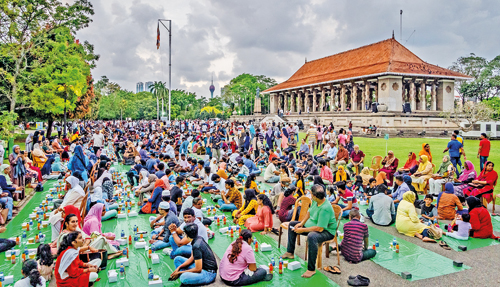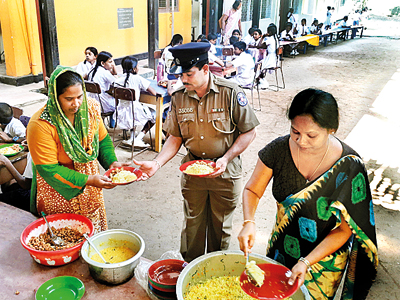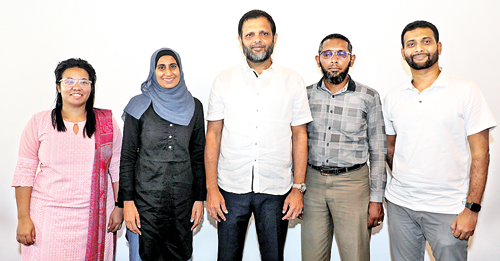Sharing an act of faith, another step in building bridges
 The month-long dawn-to-sunset fasting of Ramadan drew to a close yesterday, with all Muslims in Sri Lanka celebrating the festival of Eid ul-Fitr. Ramadan is a month of intense spiritual cleansing and rejuvenation through the practice of fasting, an act that is just one of the religious practices observed during this period.
The month-long dawn-to-sunset fasting of Ramadan drew to a close yesterday, with all Muslims in Sri Lanka celebrating the festival of Eid ul-Fitr. Ramadan is a month of intense spiritual cleansing and rejuvenation through the practice of fasting, an act that is just one of the religious practices observed during this period.
The evening of the first Sunday in April saw a crowd of about 3000 people gathered at the Independence Square in Colombo 7 to partake in Iftar, the evening meal that breaks the fast. ‘Break-Fast at Sunset’ as it was called, was a herculean effort by the Sri Lanka Muslim Civil Society (SLMCS) as well as Soup Kitchen Sri Lanka and the Torrington Walkers’ Team who extended an open invitation to people of all faiths to participate in the customs and traditions of Ramadan.
This coexistence of people regardless of faith or race is what the Sri Lanka Muslim Civil Society hoped to see when they formed four years ago when a bunch of like-minded individuals decided that civil society should play a bigger role in building bridges with other communities and clearing misconceptions; a task that has become more vital in recent years.
This year’s Iftar was not their first event, with the very first such gathering being held in 2019. Choosing to fly under the radar and work without fanfare – a philosophy shared by all members of the group, the SLMCS has also initiated projects such as Meal Care, a programme which currently provides meals once per week to 4500 students in 17 underprivileged schools in the area of Colombo. Initially funded by the community, news of the programme soon spread, resulting in many donations and pledges as well as other organisations eager to link up with the group.
“We are focused more on culture and keeping the Sri Lankan identity with Muslims. So we want to keep our culture along with the Sri Lankan identity. So when it comes to coexistence, we actually reach out to other communities, other organisations like YMBA and YMCA and we work very closely with them.” says Siddi Farook, President of SLMCS.

The ongoing school meal programme
The strong underlying theme is that no one person or group has ownership as it is distributed among all parties affiliated with the SLMCS. In fact, what is important to the group is that others come on board and join in to facilitate the outreach. The model on which the Meal Care programme is based for instance, identifies a school in need with the help of the Divisional Secretariat and involves the parents of students who come in to prepare the meals and serve them. This way, the students get a healthy meal hygienically prepared, with no wastage and which costs less as there is no outsourcing. Initially starting with four schools and growing to 17, they are now looking to add a few more schools to the programme says Project Lead of SLMCS, Mohamed Zeith.
Working closely with the SLMCS is Soup Kitchen Sri Lanka, a collective that was formed in 2015 on the initiative of a handful of women. Originally starting with the aim of providing meals to the underprivileged, it soon became about honouring people from the less fortunate walks of life. The mission grew to include healthcare with free medical camps and hygiene packs being distributed.
“One of the main aims that we had was that over 50 per cent of our recipients had to be non-Muslim. That’s the ethos that we’ve had and that’s why we worked very well with SLMCS because we share the same ideology that enough people are helping within your own community and that you need to go out and help others. It’s not even about helping, it’s about changing misconceptions,” says Zarina Akbarally, an ExCo member of the SLMCS and a founding member of Soup Kitchen Sri Lanka.
There are four pillars on which the SLMCS is built; coexistence, harmony, culture, and education, the latter which mostly consists of clearing up misconceptions – something that is widespread globally as well as locally. When the majority ethnic group in a country stands at 70 to 80 per cent, the likelihood of a community living and not meeting a person from another community is very high leading to deep conditioning, microaggressions, and pre-conceived notions of race and faith notes Media Committee Chair of SLMCS, Aashiq Aminuddin. “This fight against misinformation is quite difficult to win and the only way to do that is to get people to meet and understand each other. To get that integration right, to get people to start to mingle and to really understand each other while not knowing each other. Knowing is very different to understanding each other,” he says.

Members of the SLMCS (above - pic by M.A. Pushpa Kumara) and (top) the well-attended Iftar they organised on April 2 at Independence Square, Colombo
Operating under the tagline of ‘Humanity Beyond Religion’, the SLMCS works closely with groups and organisations of all faiths and races with the sole purpose of unifying everyone under the Sri Lankan identity. “Each of our communities has so many misconceptions about each other that we need to disperse. It’s very important coming out of this that we find some way of getting communities together to just work. One thing is that the elite will figure out a way of working around it, but we need to figure out a way of going down to the grassroots and getting it to kind of trickle down,” says Zarina.
SLMCS has been no stranger to backlash and struggles with bureaucracy, such as obtaining approval from the relevant authorities. “Why should Muslims celebrate at Independence Square? That’s how people think, so I mean, we have to really push,” admits Siddi.
The group hopes to make ‘Break-Fast at Sunset’ an annual event. The country’s economic situation though, has pressed ‘pause’ on most of their planned projects, such as an event on a national scale in collaboration with the Education Ministry which will consist of food festivals and cultural performances that provide the opportunity for all communities to showcase their culture and customs.
Photos and videos taken at the Iftar that took place on April 2 are evidence of the sense of community that the SLMCS strives to achieve – Muslims and non-Muslims all engaging in the act of breaking fast, sharing their food and drink when it looked like a shortage was imminent. If there is any message the SLMCS would like to send out, it is that they would like to invite people to do something similar and come on board, increase the interactions and therefore the amount of understanding amongst the many diverse communities that make up Lankan society.
Searching for an ideal partner? Find your soul mate on Hitad.lk, Sri Lanka's favourite marriage proposals page. With Hitad.lk matrimonial advertisements you have access to thousands of ads from potential suitors who are looking for someone just like you.


